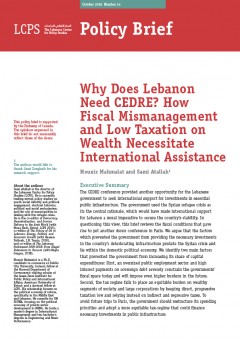|
|
 |
 PDF
October 18, 2018 | English | Mounir Mahmalat, Sami AtallahWhy Does Lebanon Need CEDRE? How Fiscal Mismanagement and Low Taxation on Wealth Necessitate International Assistance“The CEDRE conference provided another opportunity for the Lebanese government to seek international support for investments in essential public infrastructure. The government used the Syrian refugee crisis as its the central rationale, which would have made international support for Lebanon a moral imperative to secure the country’s stability. In questioning this view, this brief reviews the fiscal conditions that gave rise to yet another donor conference in Paris. We argue that the factors which prevented the government from providing the necessary investments in the country’s deteriorating infrastructure predate the Syrian crisis and lie within the domestic political economy. We identify two main factors that prevented the government from increasing its share of capital expenditures: First, an oversized public employment sector and high interest payments on sovereign debt severely constrain the governments’ fiscal space today and will impose even higher burdens in the future. Second, the tax regime fails to place an equitable burden on wealthy segments of society and large corporations by keeping direct, progressive taxation low and relying instead on indirect and regressive taxes. To avoid future trips to Paris, the government should restructure its spending priorities and adopt a more equitable tax-regime that could finance necessary investments in public infrastructure.” PDF
October 18, 2018 | English | Mounir Mahmalat, Sami AtallahWhy Does Lebanon Need CEDRE? How Fiscal Mismanagement and Low Taxation on Wealth Necessitate International Assistance“The CEDRE conference provided another opportunity for the Lebanese government to seek international support for investments in essential public infrastructure. The government used the Syrian refugee crisis as its the central rationale, which would have made international support for Lebanon a moral imperative to secure the country’s stability. In questioning this view, this brief reviews the fiscal conditions that gave rise to yet another donor conference in Paris. We argue that the factors which prevented the government from providing the necessary investments in the country’s deteriorating infrastructure predate the Syrian crisis and lie within the domestic political economy. We identify two main factors that prevented the government from increasing its share of capital expenditures: First, an oversized public employment sector and high interest payments on sovereign debt severely constrain the governments’ fiscal space today and will impose even higher burdens in the future. Second, the tax regime fails to place an equitable burden on wealthy segments of society and large corporations by keeping direct, progressive taxation low and relying instead on indirect and regressive taxes. To avoid future trips to Paris, the government should restructure its spending priorities and adopt a more equitable tax-regime that could finance necessary investments in public infrastructure.”
|
|




